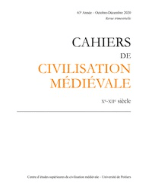
CAHIERS DE CIVILISATION MEDIEVALE
Scope & Guideline
Unveiling the Rich Tapestry of the Middle Ages
Introduction
Aims and Scopes
- Monasticism and Religious Reform:
A significant focus on monastic life, reforms, and the role of religious institutions during the medieval period, particularly within the context of the Carolingian and post-Carolingian eras. - Cultural Interactions and Exchanges:
Exploration of the interactions between different cultures during the medieval period, including the impact of Islamic culture on European societies and vice versa. - Literary and Historical Analysis:
In-depth studies of medieval literature, including hagiographies, chronicles, and epic poetry, and their implications for understanding historical narratives and cultural values. - Architecture and Art:
Investigations into medieval architecture and art, examining how these forms reflect and influence societal norms, religious beliefs, and political power. - Social Structures and Gender Roles:
Studies addressing the social hierarchies, gender dynamics, and roles of various groups within medieval society, including the experiences of women and marginalized communities.
Trending and Emerging
- Sensory Experiences and Lived Realities:
There is an increasing emphasis on understanding the sensory experiences of medieval individuals, particularly within monastic settings, reflecting a broader trend in humanities scholarship that prioritizes experiential history. - Interdisciplinary Approaches:
A noticeable trend towards interdisciplinary studies that combine history, literature, art, and theology, showcasing the complexity of medieval society and the interconnectedness of various fields of study. - Identity and Gender Studies:
Emerging themes surrounding identity, including gender, class, and ethnicity, are gaining traction, indicating a shift towards more inclusive narratives that explore the diversity of medieval experiences. - Hagiography and Normative Discourses:
A growing interest in the study of hagiographical texts and their roles in establishing normative social and religious practices, reflecting a deeper understanding of how literature shapes cultural values.
Declining or Waning
- Military History and Warfare:
There has been a noticeable decrease in articles solely dedicated to military history and warfare tactics of the medieval period, indicating a potential shift towards more sociocultural analyses. - Traditional Political Histories:
Fewer articles are focusing on the traditional political histories and chronicles of kingdoms, suggesting a movement away from a purely political narrative towards more nuanced explorations of social and cultural contexts. - Economic Structures:
The exploration of medieval economic systems, such as trade networks and agricultural practices, appears to be less frequent, possibly overshadowed by more thematic studies focusing on culture and identity.
Similar Journals
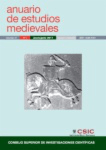
Anuario de Estudios Medievales
Diving into the Intricacies of Medieval ThoughtAnuario de Estudios Medievales is an esteemed academic journal dedicated to the field of Medieval Studies, published by the Consejo Superior de Investigaciones Científicas (CSIC) in Spain. With an ISSN of 0066-5061 and an E-ISSN of 1988-4230, the journal has been offering open access to researchers since 1996, fostering a collaborative and inclusive scholarly environment. Recognized for its high impact, it holds a commendable Q1 ranking in History as of 2023, reflecting its influence in the academic community. The journal encompasses a rich array of topics within medieval history, making it a vital resource for historians, scholars, and students alike who seek to explore and understand the complexities of the medieval period. With its indexed presence in Scopus, where it ranks 557th among 1760 in the Arts and Humanities category, Anuario de Estudios Medievales stands as a cornerstone publication, bridging historical inquiry and contemporary research in Medieval Studies.

Carte Romanze
Connecting Scholars, Ideas, and Innovations in LiteratureCarte Romanze is a prominent academic journal published by Milano University Press, dedicated to the field of literature and cultural studies. With an ISSN of 2282-7447, it offers an invaluable platform for researchers, professionals, and students interested in exploring the rich landscapes of narrative and cultural expression. Since its transition to Open Access in 2013, the journal has championed the dissemination of knowledge, making high-quality research freely available to a global audience. Situated in the historic city of Milan, the journal aims to foster interdisciplinary dialogue and innovation in literary scholarship while maintaining rigorous academic standards. As it continues to contribute to the landscape of contemporary literature studies, Carte Romanze is poised to inspire new scholarly conversations and ideas.
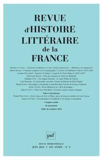
REVUE D HISTOIRE LITTERAIRE DE LA FRANCE
Unveiling the Rich Tapestry of Literary HistoryREVUE D'HISTOIRE LITTERAIRE DE LA FRANCE, published by Classiques Garnier, is a distinguished academic journal dedicated to the exploration and analysis of French literary history and theory. With an ISSN of 0035-2411 and an E-ISSN of 2105-2689, this journal serves as an essential resource for researchers, professionals, and students in the fields of literature and the humanities. Though it does not currently offer open access, its rigorous scholarship contributes significantly to the understanding of historical literary movements and their cultural contexts. Despite its discontinuation in Scopus after 2016, the journal has a notable academic pedigree, providing critical perspectives on literature from the past to the contemporary era. Situated at 6 Rue de la Sorbonne, Paris 75005, France, the journal aims to enrich the discourse surrounding literary theory and history, highlighting its enduring relevance in today's scholarly landscape.
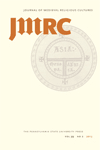
Journal of Medieval Religious Cultures
Connecting Past and Present: The Enduring Impact of Medieval Religious PracticesJournal of Medieval Religious Cultures, published by Penn State University Press, stands as a vital resource for scholars in the fields of History and Religious Studies. With its ISSN 1947-6566 and E-ISSN 2153-9650, this journal provides a platform for high-quality research focused on the intersections of religion, culture, and society during the medieval period. Its current impact factor underscores its relevance and citation frequency in academic circles, solidifying its position in the Q3 quartile for both categories as of 2023. The journal's commitment to fostering scholarly dialogue makes it an essential read for researchers, professionals, and students alike, exploring topics that shape our understanding of medieval religious practices and beliefs. Although it does not offer open access, the journal ensures that its contributions are accessible through various academic libraries, facilitating valuable insights into a pivotal era of history. Explore the latest findings and engage with leading scholarship published from 2014 to 2024 at Penn State University Press.

Magnificat Cultura i Literatura Medievals
Illuminating the Complexities of the Medieval WorldMagnificat Cultura i Literatura Medievals, published by UNIV VALENCIA, SERVICIO PUBLICACIONS, is an esteemed academic journal that has been at the forefront of medieval studies since its inception in 2014. With its Open Access model, this journal ensures that cutting-edge research is readily available to scholars and enthusiasts alike, fostering an inclusive academic environment. Based in Spain, it boasts impressive rankings with a Q2 designation in History and a Q1 in Literature and Literary Theory for 2023, indicating its significant contribution to these fields. The journal is indexed by Scopus, achieving top-tier rankings in both Literature and History, and is recognized in the 87th and 72nd percentiles of their respective categories. With a focus on the complexities of medieval culture and literature, Magnificat serves as a vital resource for researchers, professionals, and students dedicated to exploring the rich tapestry of medieval scholarship.
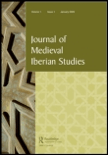
Journal of Medieval Iberian Studies
Exploring the Rich Tapestry of Medieval IberiaThe Journal of Medieval Iberian Studies is a leading academic journal published by Routledge Journals, Taylor & Francis Ltd, dedicated to exploring the diverse and rich tapestry of medieval Iberian history and culture. With its ISSN 1754-6559 and E-ISSN 1754-6567, this journal serves as a vital resource for scholars engaged in the fields of cultural studies and history, attaining a prestigious Q1 ranking in both categories as of 2023. The journal is recognized for its significant contribution to the humanities, featuring peer-reviewed articles that foster innovative research and critical discourse on medieval Iberia from 2010 to 2024. Spanning an array of topics, it encapsulates interdisciplinary approaches to medieval studies, making it an essential publication for researchers, professionals, and students alike who seek to deepen their understanding of this pivotal period in history. Although it currently does not offer open access options, the journal is committed to advancing scholarly discussion and knowledge dissemination within the academic community.

Espana Medieval
Cultivating Knowledge of Spain's Enigmatic Medieval EraEspana Medieval is an esteemed academic journal dedicated to the exploration of medieval studies within the broader historical context of Spain. Published by the UNIV COMPLUTENSE MADRID, SERVICIO PUBLICACIONES, this peer-reviewed journal has established its reputation since becoming Open Access in 2004, thereby ensuring that vital historical research is accessible to a global audience. With an impressive Q1 ranking in History and a notable Scopus rank of 773 out of 1760, this journal plays a pivotal role in shaping contemporary scholarship in the field. Researchers and professionals can expect high-quality, rigorously vetted articles that delve into various aspects of medieval history, culture, and society, contributing to a richer understanding of the medieval past. Located in the vibrant academic milieu of Madrid, Spain, Espana Medieval continues to be a leading voice for historians, promoting innovative research and fostering academic discourse. Submissions from scholars worldwide are welcomed, encouraging a diverse array of perspectives on the medieval period.

Zbornik Radova Vizantoloskog Instituta
Exploring the Rich Tapestry of Byzantine StudiesZbornik Radova Vizantoloskog Instituta is a distinguished open-access journal published by the Institute of Byzantine Studies, Serbian Academy of Sciences and Arts, located in Belgrade, Serbia. Since its inception in 2003, this journal has served as a vital platform for the dissemination of scholarly research in the fields of Classics, History, Linguistics and Language, and Literature and Literary Theory. Although it currently holds a Q4 ranking in the 2023 category quartiles, its commitment to fostering academic discourse and research accessibility is unwavering. The journal features a diverse range of articles that explore the complexities and nuances of Byzantine studies and related disciplines, catering to a broad audience of researchers, professionals, and students dedicated to the humanities. With a focus on both historical context and contemporary perspectives, Zbornik Radova Vizantoloskog Instituta aims to contribute significant insights into the academic community while promoting scholarly interaction on a global scale.

Espacio Tiempo y Forma-Serie III-Historia Medieval
Connecting Scholars through Open Access Medieval StudiesEspacio Tiempo y Forma-Serie III-Historia Medieval, published by the Universidad Nacional de Educación a Distancia (UNED), is a prominent open-access journal dedicated to advancing research in medieval history. Since its establishment, this journal has gained a significant reputation within the academic community, achieving Q1 rankings in both Classics and History, reflecting its commitment to high-quality scholarship and insightful contributions to the field. With a remarkable Scopus ranking of 36th in Classics and 589th in History, it places itself among the top-tier publications, ensuring visibility and impact for its authors. Open access since 2011, the journal promotes the dissemination of knowledge to a broader audience, enhancing academic engagement and fostering collaboration among researchers globally. With its rich resources, the journal attracts a diverse readership, including historians, students, and professionals keen on exploring innovative perspectives in medieval studies.

Revista Chilena de Estudios Medievales
Connecting Scholars to the Legacy of the Medieval WorldRevista Chilena de Estudios Medievales, published by Universidad Gabriela Mistral, is a premier open access journal that has been serving the field of medieval studies since 2012. With its unique ISSN 0719-2215 and E-ISSN 0719-689X, this journal provides a vital platform for scholars, researchers, and students interested in the rich tapestry of medieval history, literature, and culture. Located in Santiago, Chile, at Ladislao Errazuriz 2073, Providencia, Santiago 00000, the journal aims to foster a deeper understanding of the medieval period through interdisciplinary research and insightful articles. While impact factors and HIndex data are currently unavailable, the journal is dedicated to maintaining high academic standards and promoting knowledge dissemination in the field. Its open access model ensures that research is freely available to the global community, thereby enhancing engagement and collaboration among medieval studies scholars. Join us in exploring the depths of the medieval world through Revista Chilena de Estudios Medievales.